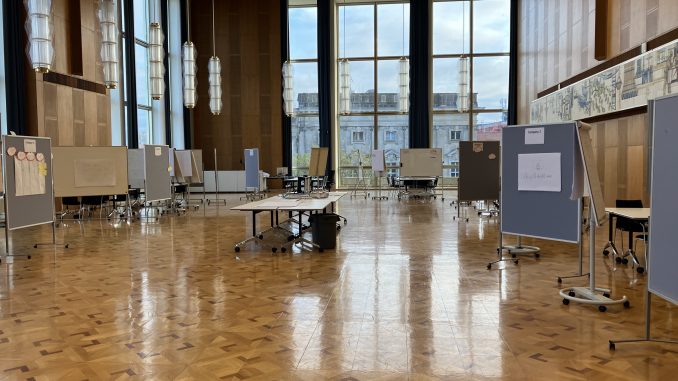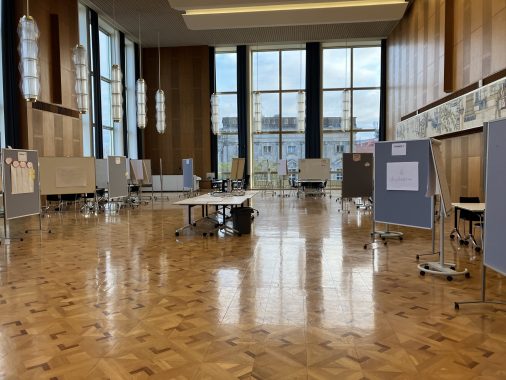

It has been an exciting and busy two months since I last wrote about my experiences at ESMT. I have been learning a lot, both inside and outside the classroom, and I am excited to share all my new discoveries with you, from finding the right papers to participating in a business simulation and traveling to Portugal.
Negotiations
The first day of the residency focused on negotiation. We gained insights into theory through special studies. It was good to get a scientific perspective on the subject. We learned what the most important components of negotiation are, negotiated both individually and in groups, and also learned about what role behavior plays. So, all in all, a very busy day but a knowledgeable one. On the second day, we had to hand in our business plan around noon. And from then on, we continued with the business simulation.
Business simulation
Business simulations are computer-based programs that allow the student to create, manage, and run a virtual business. The student is responsible for decisions such as defining the business, setting prices, and managing budgets. The goal is usually to maximize profits while effectively running the business. Business simulations often include features such as simulations of the competitive environment, market conditions, and customer behavior. By creating a virtual world, students can practice and expand their business skills, such as decision-making, problem-solving, and team building.
Before the simulation started, we were given a handbook to look over and then played a treasure hunt game, where we had to collect as much information as possible from the handbook within a few hours. This allowed us to acquire starting capital for the simulation by answering the questions correctly.
We were divided into groups and assigned roles, splitting our tasks respectively into marketing/sales, logistics, production, R&D, finance, and management.
We had to enter decisions in the respective areas every few hours into the system. The decisions included, for example, what price to set, what products to produce, any investments, and much more. After the time for the decisions had elapsed, we were updated with the results, and depending on the investments made in the market analysis, these reports were also shared. As the week progressed, the time for decisions became progressively shorter. On the last day, we presented to shareholders from the simulation company. It was an interesting week, concluding with feedback that we provided in the group and as a group.
Portugal – optional module
When I published my last blog article, I was in Portugal. The extra module in Portugal is not part of the EMBA modules which is why I only want to give you a small impression.
The reason we had this module was that we could not do our Global Network for Advanced Management Residency in the respective countries, but everything took place remotely. Which is a pity, of course, because we were assured of three modules abroad. Nevertheless, due to ESMT’s good organization and quick response, we were able to register for an extra module in Lisbon.
Approximately half of our class enrolled in the additional module. As with every residency, we had preparatory tasks to complete. So, if you think this was a vacation, you’re wrong. But of course, the atmosphere in the classroom and after class was very different. Imagine, in contrast to Germany, it was still warm in Portugal.
The subjects were:
- Global Economy and Politics
- Career Crucibles
- Sustainable Energy Future
Of course, I don’t know what it would have been like if the GNAM week had taken place in the respective universities, but I thought the week in Portugal was very well done.
Final report
I can hardly believe it myself, but my studies are coming to an end. Residency 8 was the last normal week at ESMT at Schlossplatz 1. We will only have one more module abroad and the stay for our graduation. We have the choice between two final works, project work or a master thesis.
Project work
The project work takes place mainly in the company where you work. A real business problem is sought, which is to be analyzed and solved with concrete proposals. Two examples would be: How can we increase our turnover by Y percent within the next X years? How can we improve the company culture within the next X years and thus increase the retention rate by Y percent?
To prepare for the project, we had a total of ten online seminars in which we were guided step by step from the question to the structure of the final presentation. The seminars are not only helpful for the final work but can generally be used as a tool for future project work.
Unfortunately, it is not possible for everyone to carry out project work. Reasons for this can be a change of company, no sponsor in your own company, etc. In my case, the company was simply acquired and there were no longer any issues in the company. Except, of course, for the ramp-down.
Master’s thesis
So, I decided to write a master’s thesis. Here we had to decide on an area that corresponds to the program curriculum. Accordingly, we were assigned a faculty supervisor and received a total of three appointments to discuss our thesis. We must choose a topic that interests us and to which we have data access. An empirical analysis is sought. Of course, this is quite a bit of work, since you have to read a lot of literature. And in my case, the surveys and interviews are still to come. It’s definitely still going to be exciting. Maybe I’ll tell you a little more about my subject in the future. After all, I want you to still be excited.
That said, I’ll say goodbye for now as I’m delving further into my thesis, and after I’ve handed it in, I’ll come out of the cave again.
– Stay tuned –
